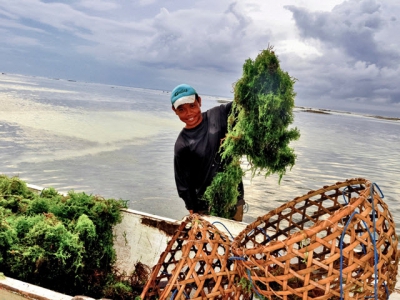Seaweed farming could help battle climate change

Researchers say harvesting algae could be a powerful tool for sequestering carbon.
A farmer harvests algae in Nusa Lembongan, Indonesia. Photography BTWImages/Shutterstock
Seaweed. It’s the bane of swimmers, and can ruin a nice day at the beach. But harvesting the aquatic plant could play a role in mitigating the effects of climate change.
A new study conducted by scientists at UC Santa Barbara found that seaweed farming could be a powerful new tool to sequester carbon and offset greenhouse gas emissions. Researchers say seaweed farming alone won’t balance global emissions from agriculture, but it could help meet local carbon neutrality goals.
“It’s not a silver bullet, nor an industry that exists yet,” one of the study’s authors, Halley Froehlich, said in a press release. “But it has huge potential.”
Researchers say the process involves burying harvested seaweed deep in the ocean along with the carbon in its tissues. Most of the world’s seaweed farming happens in Southeast Asia. Small seaweed farms are starting to pop up in the U.S., but are mainly for food and other commercial purposes rather than carbon sequestration.
The study identified around 30 million square miles of ocean where seaweed could be farmed. Researchers say the benefits of seaweed farming far outweigh the fact that it won’t completely offset the carbon emissions for the entire agricultural industry.
Study co-author Benjamin Halpern said there will never be a single easy tool to deal with climate change, and that all efforts are necessary.
“The problem has become too big for simple solutions,” he said. “We need all hands on deck.”
Researchers plan to continue their work on seaweed farming to maximize its effectiveness in sequestering carbon.
Related news
 What Is the Environmental Impact of Aquaculture?
What Is the Environmental Impact of Aquaculture? The environmental impact of aquaculture is completely dependent upon the species being farmed, the intensity of production and the location of the farm
 Integrated utilization of microalgae grown in aquaculture wastewater
Integrated utilization of microalgae grown in aquaculture wastewater The global growth of fish farming has resulted in serious concerns regarding environmental pollution related to the aquaculture wastewater and over-exploitation
 How poultry byproducts can help reduce aquaculture’s environmental footprint
How poultry byproducts can help reduce aquaculture’s environmental footprint Using poultry-based ingredients instead of fish meal ad fish oil in aquafeeds could help to substantially lower the aquaculture sector’s environmental footprint